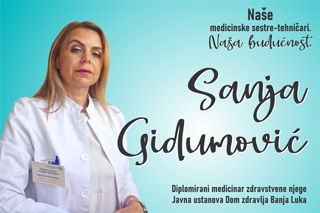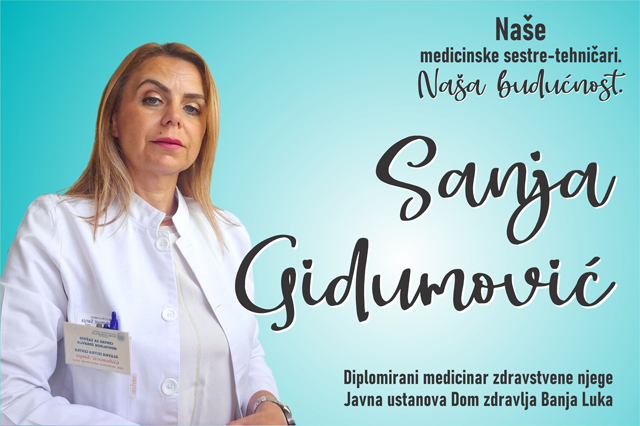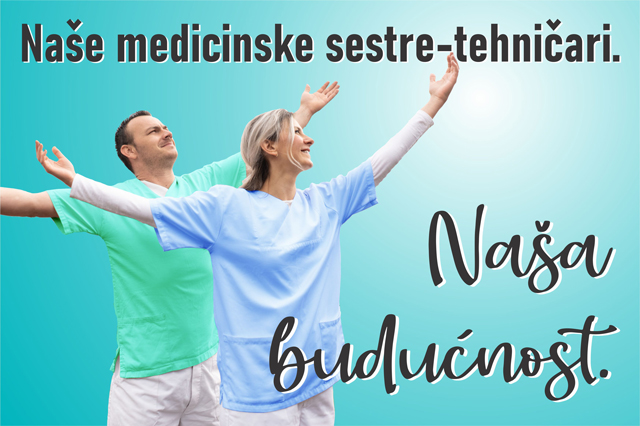
Sanja Gidumovic, a nurse and healthcare manager, has been employed at the Primary Health Care Center (PHCC) Banja Luka since March 2001.
The first working days in healthcare... I started working in healthcare at the age of 22, following my graduation from a nursing faculty. I decided on this profession because it is not just a job, it is a vocation that seeks the most beautiful in a human – being humane and committed to this call.
Current position... Since March of this year, I have been holding a position of the Head Nurse of the PHCC Banja Luka. Before that I spent 23 years working at the Center for Mental Health, holding a postition of the Team for Children and Youth as an Occupational Therapist and Prevention Coordinator. Since 2010 until March 2024, I held the position of the Head Nurse of the Center. Also, at 2013, by the decision of the Ministry of Health and Social Welfare of Republika Srpska, I became a certified trainer for Case Management/Coordinated Care, and Agency for Accreditation and Improvement of the Quality of Health Care of Republic of Srpska’s evaluator for mental health centers. I achieved personal growth and development, and acquired professional competences through various trainings in the area of mental health of children and young people, as well as adult psychiatry, both as a therapist or a trainer.
What is it like to be a nurse in Bosnia and Herzegovina? Being a nurse, working and living that job means, among other things, possessing professional knowledge and skills, being an emotionally mature and stable person, a person who will be able to understand and deal with human suffering, deal with ethical dilemmas, who will be able to understand the patient's feelings and behaviors in a certain situation, and a person who will be ready to accept responsibility.
What are the shortcomings in the institution where you work? What would you change? I believe that the health care system is currently facing numerous challenges, including the institution where I am employed. The basic problem is the lack of staff, primarily family medicine doctors, inadequate standards and norms that also affect both personnel issues and the ways of financing. Systemic solutions are necessary in solving these problems.
What about the nurse’s position in Bosnia and Herzegovina? The challenges faced by the healthcare system of Bosnia and Herzegovina significantly affect the nurses’ position. Nurses are the pillar of the health system, the most numerous, and the Covid-19 pandemic has shown that without nurses there is no adequate response to various challenges in the health system. This is a profession full of stress and sacrifice. On the one hand, it is necessary to fulfill the obligations of this humane call, and on the other hand, to respond to the demands of the organization of work within institutions, which is always aimed at the satisfaction of our patients. The nursing profession sometimes requires greater engagement due to the increased volume of work, often with inadequate working conditions and income compared to the work done. Therefore, it is necessary to take a more serious approach to solving the problem and influence the position of nurses.
Good and bad sides of the nursing profession? I believe that nursing is more than a profession – it is a calling that requires passion, dedication and desire to help. Being a nurse gives me a deep appreciation for life and the beauty of humanity. Every day I meet people of different age in their vulnerable states. Helping a person get well and seeing a smile on their face is a wonderful feeling. And that is why it is wonderful to be a nurse.
Nursing, unlike other professions... There are many professions, but nursing is both a profession and a mission, the inner feeling of a must, which is a drive, is the privilege of life, but it can be demanding, with many efforts and burdens. I believe that nurses are among the fastest people in the world that you will ever meet, and they do not participate in the Olympics and never win a medal or trophy. A diploma or recognition, sometimes… They are the champions in other areas as well. While an average person cares for only a few close people, a nurse cares for thousands of them in her life.
How important are the nurse-patient and nurse-doctor relations? In recent years, the role of the nurse in the provision of nursing services has changed significantly. In the nurse-doctor relations, the nurse becomes an equal member of the health team (interdisciplinary, multi-disciplinary) in accordance with his/her competences, as well as education and continuous professional training. Teamwork and good communication between nurses and doctors is a guaranteed way to reduce the risk of error and provide better quality health care in order to satisfy the services end users - patients. A nurse is the link between a patient and a doctor. The most important thing for me, as a nurse, is to first build a positive relations with patients in order to create an environment that is conducive to their recovery and well-being. Then, it is equally important to me that the care is provided in a competent and professional manner. Achieving a good therapeutic alliance between the nurse and the patient in the first place requires empathy. This means you can understand patients' feelings, concerns and needs, and provide support and security. A successful nurse possesses excellent communication skills that are the key to building trust with patients through clear and detailed answers to their questions. Nurses, as the most numerous members of the healthcare team, spend the most time with the patient. The advisory role of nurses for patients and their families is one of the most common nursing interventions. Communication is the basis of the private and professional life of a nurse. This approach ensures trust and safe and supportive environment for the patient.
How to prevent nurses’ outflow from BiH? As technology advances and takes an increasingly important role in medicine, nurses face increasing pressures. The real challenge is to establish a balance between technology and humanity, that is, the human way of dealing with patients. No machine will ever be able to replace the care and compassion of a nurse. Population migrations are present everywhere in the world, including here. However, the outflow of high-quality, experienced, educated and trained nurses indicates the dissatisfaction with working conditions, income, and general safety in the working and living environment. In order for nurses to be motivated to stay in the country, it is necessary to make a maximum effort to properly value the nursing profession. Among other things, the solution is to improve working conditions, provide adequate salaries and benefits, strengthen and ensure nurses’ continuous professional development while raising awareness of the importance of the role of nurses in the health system through the promotion of the profession and increase of their social status.
What are the most common problems that nurses face in Bosnia and Herzegovina? Problems faced by nurses: low incomes, inadequate working conditions, vaguely defined nurse competences in accordance with education profiles and an increasingly common problem - violence at work. According to certain studies, nurses are "included in the group of workers who are exposed to an increased risk of abuse and violence at the workplace". The cause of the problem is often patients who have a low tolerance threshold, under the influence of alcohol/drugs, exposed to stress or in a period of grief/mourning. Nurses also have to struggle with exhaustion caused by stress. One of the factors is the lack of staff. If a responsible nurse cannot provide adequate patient care because she is too busy, she will be subject to stress. When a nurse tries to solve the problem by giving up his/her breaks and working overtime, it only seems to cause further frustration.
Work and conditions during the coronavirus pandemic? The COVID-19 pandemic has shown that nurses are a very important link in our health system. A responsible, self-sacrificing, dedicated and professional attitude in the crisis situation made it possible to preserve and prevent the collapse of the health system, and the end result was a successful battle against the pandemic. The pandemic required a very "quick response" to the situation, which was changing from hour to hour. The reorganization of services in institutions, the formation of the COVID department, participation in the formation and work in quarantine, the opening of vaccination points, personal protective equipment in order to preserve one's own health in order to be able to provide adequate help to the population, and finally stress and burnout syndrome, had a significant impact on the nurses’ awareness of their importance and role in providing health care services in a crisis situation.
How important are additional trainings for medical workers in Bosnia and Herzegovina? Modern nursing requires education as a priority in the professional life of the nurse. The success of a nurse depends not only on her humanity and ability to master modern technology, but also on continuous development primarily through formal education. Modern nursing favors education as a priority in the professional life of nurses. Higher nurse education is a priority of modern countries. In recent years, an increasing level of professional knowledge has been demanded from nurses. Therefore, it is extremely important to have a desire to learn and to be able to understand what is being taught. In addition, nurses should make quick decisions and intervene urgently when the situation requires. We are facing the problem of an aging population and a decrease in the number of doctors in primary health care, which leads to the need of increased expertise, knowledge and skills in order to respond to growing challenges and control the increase in chronic and complex diseases. Therefore, the key role of the nurse is to educate patients about disease prevention, health maintenance and chronic disease management, which requires continuous education and monitoring of innovations in the field of healthcare.
The significance of Fami Foundation for the medical profession in BiH... Fami Foundation, in cooperation with the relevant ministries, has a significant contribution in strengthening of nursing profession in Bosnia and Herzegovina. The most important result of the long-term support of Fami Foundation is the visibility of nurses, that is, they repeatedly show how important the nurses really are for the health system. Training for community nurses, which is of great importance for socially excluded populations, increased the availability of services and influenced the quality of health care. Thank the experienced lecturers, in a professional but also fun way, the nurses acquired, and continue to acquire, knowledge in various areas of health care, including management and leadership. The creation of SOPs for primary and secondary level of health care had a significant impact on the standardization of the nursing profession, and thus on the quality of services provided to the satisfaction of our end users - patients. It is important to emphasize the importance of the donation of equipment for community nurses, as well as the publication of SOPs and guidelines for their application. Also, they significantly influence the promotion of nursing providing support to nurses in professional development and education.
An event from your career that you will always remember... Well, there are many of them, but I am primarily thinking of the events from the COVID-19 pandemic, when all eyes were on us and when we were the biggest support, hope, and light for our population, but also for us. For me personally, the thank-you letter from the Ministry of Health and Social Welfare of Republika Srpska, which I received for my exceptional commitment and engagement in the reform of mental health in Republika Srpska, is very special.
A message to future nurses... You must love people and have a sincere desire to help them. You have to be ready to handle stress, because nurses are not allowed to make mistakes. You have to be flexible so that you can sometimes do your regular work with fewer collaborators — without sacrificing the quality of the work. "Doing what no one else will, in a way that no one else can, despite everything that surrounds us and what we go through - that's what it means to be a nurse." - Rawsi Williams.



